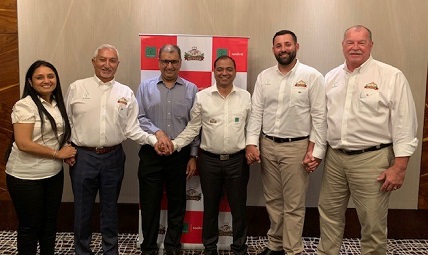INI Farms, one of India’s leading horticulture firms, recently announced a partnership with Munger Farms, a large US firm for cultivation of exotic fruit such as blueberries in Mumbai as well as foster India’s exports of pomegranates to the US along with other markets.
Blueberries is a niche product. It is a super fruit but then it is expensive because of which masses in India are not able to consume. While talking about this, Pankaj Khandelwal, chairman & managing director, INI Farms, and David Munger, owner and director, Munger Farms, said they are trying to make it more accessible to the Indian consumers from the price perspective. Further, they spoke about the range of exotic fruit variety they are planning to launch in due course, in a conversation with Vijetha Iyer. Excerpts:
What are the exotic fruit varieties you are focussed on?
We are focussed on blueberries, strawberries and pomegranate. Although, pomegranate is an exotic fruit in other countries but in India it is a household fruit. There is zero production of blueberries in India. If you look at berries as a category, there is nothing that is cultivated in India except strawberry so this will be a pathbreaking initiative.
How will the partnership help Indian farmers?
The basic requirement is that we have to improve the farmers’ income. Fruits like these will have a greater value. So, farmers will be benefited more. As long as you get the product of high value, you have to provide the right technology into it you can improve per acre of the farm. Berries as a category worldwide, the farmers’ income would be highest compared to any other product in the horticulture sector. On an average, if a farmer earns 50k-70k per acre, this category will increase their income compared to the average income. It will also help in bringing new technology, new varieties, setting up demonstration farms. On a per acre realisation, there is absolutely no fruit in the world that will give this kind of return to the farmers.
What are some of the key target markets?
The US is a closed market for pomegranate for India but in the last couple of years, we are planning for export with the same partnership while Indian context is all about blueberries growing, importing and taking it into Indian market. On the pomegranate side, whether it is value-added additional products as we will be exploring more market opportunities.
We will be growing blueberries in India, the opportunity to export the product across the region likewise Dubai can be a good market. The ship from India to Dubai v/s the ship from US to Dubai has lot of extra cost so the consumer in Dubai is paying higher price, we can help with the cost structure. We can provide good products to the consumers at a fair price. The Middle-East is a very big market, so is the Southeast Asia market.
The number of cold chains in India being less, how do you intend to export the fruits?
We have a large infrastructure which is in Pune, to take care of the requirement. When we export the fruit, we need to move the fruits into cold chain as early as possible so the infrastructure is created in the growing region even for the berries so it will be an integrated cultivation and post-harvest facility which we will be looking so in our case, we have built an infrastructure which caters to the requirement of the products that we have and we ensure that we deliver to the customer.
Since you have partnership with Munger, are you planning for organic farming?
We do believe that the market has a desire for organic, we have to do a detailed research and learn on how it will work here and how we could grow plants in organic manner. For example, back in the United States, in Munger, the majority of our product is organic, so we are a organic producer. If you have to grow the fruit organic or non-organic, the techniques for both will be very different. We have to do research then we will decide if we can be successful in organic side.
Which are the channels through which the produce will be available in the domestic market?
We will begin with modern trade because berry is a sensitive product and it will require controlled temperature even if it gets to the retail shelf. So, we will be focusing on modern trade pan-India.
Were there any regulatory or other challenges that you faced during the tie-up?
As far as the regulatory requirements are concerned, the government is very supportive of getting new technologies and support the farmers. The work we are doing actually comes under Foreign Direct Investment (FDI) route and automatic route so there is absolutely no requirement. We need to be compliant with local law completely that has to be done whether it is an Indian company or if it’s a joint venture.
